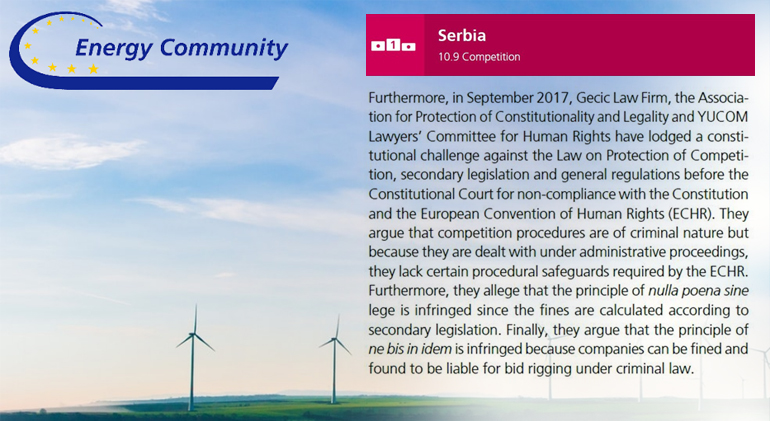

Founded through the Energy Community Treaty signed in 2006 by Albania, Bosnia and Herzegovina, Georgia, the former Yugoslav Republic of Macedonia, Kosovo (in line with UNSCR 1244 and the ICJ Opinion on the Kosovo declaration of independence), Moldova, Montenegro, Serbia, and Ukraine, and with Armenia, Norway, and Turkey acting as observers to the Treaty, the Energy Community plays a key role in connecting these markets to the EU internal energy market. Its activities – which cover gas, electricity, security of supply, renewable energy, oil, energy efficiency, environment and competition – are 94.5% financed by the EU budget, according to the European Commission. Ministerial Council, made up of ministers from all countries signees to the Treaty, constitutes a decision making-body that is assisted by European Union, usually represented by the European Commissioner for Energy and a high-level representative of the Presidency of the Council of the European Union. The post is currently held by Mr. Maroš Šefčovič, the European Commission Vice-President responsible for Energy Union. As stated on the organization’s website the “Energy Community Secretariat is the only permanently acting institution of the Energy Community responsible for supporting the day-to-day activities of the Energy Community and monitoring the implementation of the Treaty establishing the Energy Community.”
The Serbia Competition chapter of the Report (available online) elaborates on the latest developments concerning “a constitutional challenge against the Law on Protection of Competition, secondary legislation and general regulations before the Constitutional Court for non-compliance with the Constitution and the European Convention of Human Rights”. This refers to the internationally recognized constitutional challenge submitted by our law firm along with the Association for the Protection of Constitutionality and Legality (UZUZ) and the Lawyers’ Committee for Human Rights (YUCOM). The Report further details the arguments emphasized in the constitutional challenge, including: “that competition procedures are of criminal nature but because they are dealt with under administrative proceedings, they lack certain procedural safeguards required by the ECHR”, that “the principle of nulla poena sine lege is infringed since the fines are calculated according to secondary legislation”, and “the principle of ne bis in idem is infringed because companies can be fined and found to be liable for bid rigging under criminal law.” [emphasis added].
On the other hand, the Report suggests “the Law on Protection of Competition is largely in line with the competition acquis. However, its implementation and application in the energy sectors still has to be improved.” The Report also reflects on the fact that the Serbian Competition Protection Commission’s “cooperation with the Secretariat is very satisfactory; however, it should also engage in cooperation with other national competition authorities in the framework of the Energy Community Competition Network.”
The full annual report, which among other things states that Serbia is lagging behind in the implementation of the European Union’s Third Energy Package, although the adopted secondary legislation constitutes a largely compliant legal framework, is available below:
 Annual Implementation Report
Annual Implementation ReportAs a reminder, on September 11, 2017, the Bar Association of Serbia (AKS), the country’s national bar—and, subsequently the Bar Association of Belgrade and the Bar Association of Vojvodina—submitted a constitutional challenge to the Constitutional Court against the Competition Act and all secondary legislation, as announced on its website. This landmark development was supported by a unanimous vote of the national Bar’s Board, including representatives of all regional and city bars. Together with the challenge, the Bar Association submitted a motion for stay of proceedings under way against the Association before the Serbian Competition Commission. With around 10,000 lawyers, the Serbian Bar Association is the largest assembly of legal professionals in the West Balkans. Furthermore, the preeminent competition blog in Europe, Chillin’Competition put out a piece on the most recent developments in Serbia and the Balkans together with an exclusive publication of our constitutional challenge in English. This is one of the rare, if not the only time for this region to come under the spotlight of this esteemed competition blog.
It is very important to note that the ongoing challenge is not the first of its kind – Professor Dijana Marković Bajalović, one of the founders and renowned presidents of the National Competition Authority along with others, filed a constitutional challenge against the Protection of Competition Act in 2015, thus shedding the light on this important issue and bringing it before the Constitutional Court. To the surprise of many legal experts, this landmark development, and in many ways clairvoyant as it heralded a broader action that took place in recent months, received little media coverage at the time. In recent piece, Professor Bajalović, who famously took on Delta, for the illegal takeover of C Market, and stood up to local tycoon Miroslav Mišković, stressed the inadequacy of the Competition Act and called for amendments that would finally limit the extensive powers granted to the NCA. As depicted in the title itself “Judge, Jury and Executioner”, Professor Bajalović emphasizes that the excessive use of powers by the NCA inherently represents “a State within a State” behavior. An in depth look at Professor Bajalović recent involvement is available here and an original copy of the 2015 constitutional challenge in Serbian language is available below: